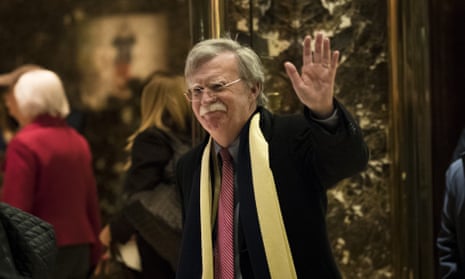Donald Trump’s selection of John Bolton as his new national security adviser has prompted alarm in Washington, with skeptics expressing concern at the prospect of an unwavering advocate of military action shaping the president’s national security policy.
Bolton, who has argued for using military force against Iran and North Korea, will take over from HR McMaster early next month – which means that Trump will approach two of the most consequential decisions of his presidency with a new and bellicose team.
Trump announced the switch in a tweet late on Thursday, writing that he was “thankful for the service of General HR McMaster who has done an outstanding job & will remain my friend”.
Republicans on Capitol Hill swiftly rallied behind Trump’s decision, but Democrats warned Bolton’s hawkish bona fides could lead the US into confrontation.
“While the president may see in Mr Bolton a sympathetic sycophant, I would remind him that Mr Bolton has a reckless approach to advancing the safety and security of Americans – far outside any political party,” said Bob Menendez, the top Democrat on the Senate foreign relations committee.
Senator Ben Cardin, another Democrat on the committee, dubbed Bolton “an extremist and reckless partisan with little regard for US values or allies”.
Speculation over McMaster’s departure had mounted in recent weeks amid a White House shakeup that also saw the firing of secretary of state Rex Tillerson and resignation of national economic adviser Gary Cohn.
Bolton, who has informally advised Trump in the past, was a fierce advocate of invading Iraq and allegedly played a role in building the case that Saddam Hussein possessed weapons of mass destruction. Even after the US intelligence was proven to be false, Bolton has remained steadfast in defending the war.
Richard Painter, the former chief White House ethics lawyer under George W Bush, decried Bolton as “by far the most dangerous man we had in the entire eight years of the Bush administration”.
“Hiring him as the president’s top national security advisor is an invitation to war, perhaps nuclear war,” Painter tweeted. “This must be stopped at all costs.”
Bolton, who ran a short-lived campaign for the Republican nomination in 2016, has also written editorials calling for military action against both North Korea and Iran.
In an op-ed for the Wall Street Journal last month, Bolton outlined “the legal case for striking North Korea first” and in 2015, during negotiations over the Iran nuclear accord, Bolton wrote in the New York Times that the US should instead “bomb Iran”.
Bolton joins the ranks of other hawkish figures in Trump’s inner circle: Mike Pompeo, who served as CIA director, is poised to replace Tillerson as secretary of state; and Gina Haspel, who has been accused of playing a key role in the CIA’s post-9/11 torture program, is Trump’s choice to lead the US intelligence agency.
But while Pompeo and Haspel must be confirmed by the US Senate, the post of national security adviser is not subject to confirmation and entirely at the president’s discretion.
Republicans welcomed Trump’s move, marking the latest sign that the party has fully embraced the president’s unconventional approach to governance.
Senator Lindsey Graham, one of the most vocal defense hawks in Congress, said: “Selecting John Bolton as national security adviser is good news for America’s allies and bad news for America’s enemies.”
